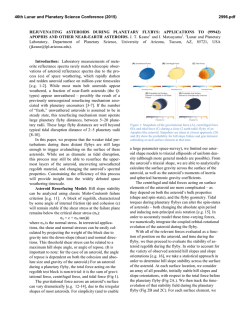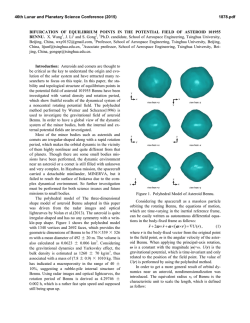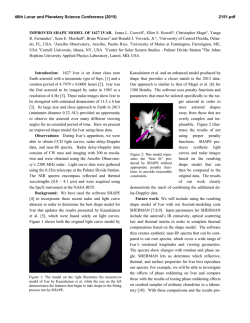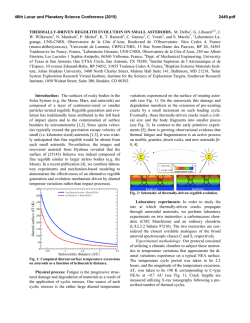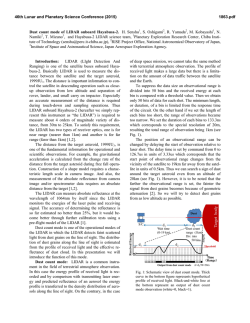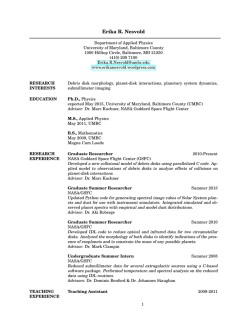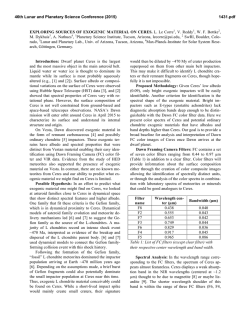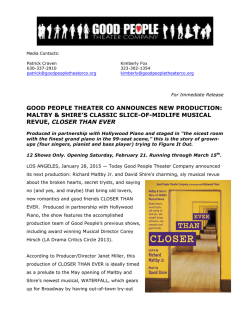
Reaching out, Tumbling Down by Warren Glynn Things were
Reaching out, Tumbling Down by Warren Glynn Things were looking pretty grim by the time the asteroid hit, so it didn’t matter much to you anyway. You had spent the better part of a year going to the movie theater, trying to get the pretty usher’s attention, but little progress had been made. You were beginning to feel a small, breaking sensation somewhere inside yourself, but this of course preceded the large, smashing events all around you. The usher’s name was Eleanor. You knew this because you read it on her name tag. Eleanor felt like a name that belonged to an old lady, a grandmother’s name, but after a while you came to realize that it fit her. She was about 5’6” with dark brown hair—almost black—and had wide green eyes. Eleanor’s eyes were the first things you noticed, something you had picked up on as she ripped your ticket for a busy midnight premiere and handed your stub back to you. They were a pale green that reflected a lot of light, and so you thought she was looking at you, until she actually looked at you—then all that light suddenly seemed to focus right into you. You, incidentally, looked terrible. Tall, but too much so—you were dangerously lanky. You felt that your face was so awkwardly shaped that any haircut you got looked artificial and wig-like, and this subsequent lack of confidence caused you to constantly droop your head, as if in apology for your head’s mismanaged state. It never occurred to you that this drooping only exacerbated your appearance of lankiness. Instead, you were busy worrying about keeping your face from scrutiny—hoping that if you successfully hid your faults, someone (Eleanor in particular), would reach out, and find only the parts that you wanted them to. You saw a lot of movies at the theater. Sometimes, before you encountered Eleanor, you used to take dates there, but these were both rare and awkward events that never lead to anything more than a single evening out. You mostly went by yourself. You didn’t know Eleanor’s exact schedule—you didn’t want to, since it would make your encounters with her feel planned and forced—but you knew she worked on most Wednesdays, and so you saw movies on Wednesdays. Eleanor herself, though, never seemed to take your encounters for anything more than work. After a while, she recognized you as a regular, but the two of you never exchanged anymore more than formal pleasantries. This was frustrating enough, but once you saw her start talking to a male usher—a blonde boy who made her laugh and who was much more attractive than you—you became hopeless. Wednesdays became days where you would buy your ticket, slouch meekly past Eleanor and the male usher to hide the flurry of emotions you were sure neither of them noticed, and then sit in the theater and mope at both your disappointment and the sheer irrationality of it. You were at the theater when the asteroid hit. Luckily, you were in an area of the world that was not immediately incinerated, but you were still hit with the seismic waves of the impact. You were at the snack counter at the time, putting a straw into a giant blue Slurpee you had just purchased. You felt the earthquake as a deep rumble in the ground, and then chunks of the ceiling and walls started to fall down. Large pieces of plaster and metal fell down, cratering the floor and crushing cardboard celebrities and spraying debris in all directions. People were screaming and running, and you stood by the snack bar, numbly sucking at your Slurpee, watching the chaos and somehow miraculously untouched. Eventually, when there was a lull in rumbling, you started off across the ruined lobby, Slurpee firmly pressed to your lips. You sidestepped boulder-sized ceiling chunks, live electric wires, and victims of both—cardboard and otherwise. You reached the last pair of intact doors when you heard a voice. “Hey! You! Tall guy!” It was Eleanor. You turned and saw she had her foot stuck underneath a piece of debris. “Help me!” You stood with your Slurpee and stared. You wanted to help her, of course. But what if you couldn’t? What if you didn’t have the strength to move the debris off her foot? You would be embarrassed. But now you were embarrassed of being embarrassed—this was a person in need of help, not a dating opportunity. You should try to help Eleanor regardless of whether you could actually do it or not. “Hey! Seriously! Help!” Eleanor’s voice broke you out of your reverie. You were now embarrassed of having even thought you had the time to be embarrassed about being embarrassed, but you pushed this development aside. “Sure,” you say, feeling your blue-stained lips crack open and spill the word out. You hunker down next to her, abandon your Slurpee, and grab ahold of the piece of plaster covering her foot. It’s heavier than you expected, but not so much that you can’t lift it a few inches off the ground so Eleanor can pull her foot free. Luckily, her foot is unbroken, and she can stand and walk with only a minor limp. “Thank you!” she says, and your eyes meet. You flinch away, but she doesn’t notice— she’s already looking at the ruins of the theater lobby. “What happened?” she asks. You don’t answer, but she goes on. “We should head to the fire station. I think that’s where you go for emergencies, right? My boyfriend should be there. He has a pickup truck. He’ll know what to do.” You feel a lump in your throat, icy cool from the Slurpee, but with a sickly warm center. She has a boyfriend. And not even the attractive, funny, and blonde usher you were so troubled by, but someone else. A firefighter, you assume. A pickup truck-driving, hose-wielding, babyrescuing firefighter. With muscles. The lump in your throat tightens, but seems to spread all over, filling you with the flush of emotions and the cool void of disappointment at the same time. “Come on!” she says, and you realize she’s at the doors, holding her hand out to you. “We have to go!” You pause. You want to go with her, but nothing feels right. “Come on!” she repeats. “Hurry!” Your eyes meet again, and you flinch away. But you also move towards the doors. Still hunching and hand outstretched—sticky, clammy, and tinged with blue—you take hold of hers, and leave the theater. *** You already knew something was up by the time the asteroid hit, but you didn’t expect it to be this fun. You were a volunteer firefighter, but you spent most of your weekdays at the public university, taking classes and thinking about enrolling full time. You were currently taking as many physics classes as you could. Physics had turned out to be your favorite subject, and you had made this discovery by smashing things. You were very good at smashing things. As a firefighter, you got to smash a surprising number of objects: doors, car windows, burning walls, the possibilities were endless. Once you drove the fire truck out on a call and in your hurry you accidentally smashed the corner of a parked car. You had to pay for the damage, but the experience of smashing—the kinetic, reactive jerk you got once your siren-laden body in motion had hit the inert, Toyota Prius secondary body—was enough to make it worthwhile. And physics, you found, was the study of smashing things. Or at least part of it was. The idea of infinite, invisible bodies constantly smashing and combining and reacting was enough to propel you through hours of tedious study and lab work. You found out something was wrong during a meeting with one of your professors, Dr. Herzler. You were discussing the possibility of becoming a full-time student, but she seemed distracted—she wouldn’t look you at you directly and kept fiddling with her pen, toying with it and then putting it down, only to pick it up and place in somewhere else, until it looked anxious and desperate. It was only when you mentioned your idea about physics and smashing that she started weeping in light but prolonged gasps of air, tears trailing down her cheeks in neat, rapid succession. “I’m so sorry,” she said, reaching for a box of tissues on her desk. “I didn’t mean to… I just—there’s something going on, and I’m afraid that…” You weren’t able to determine what Dr. Herzler said after that, since she then started crying in earnest, with loud huffs of air that came deep from the chest. You assumed she was upset about your physics/smashing idea, and you felt a burning flutter of embarrassment that stretched from your face down to the pit of your stomach. You stood and left her office with a muttered apology, and went home. You lived in a small apartment about thirty minutes away from campus with your girlfriend, who worked as an usher at a movie theater. She was there when you arrived, after you squeezed your pickup truck into the small adjacent lot and clambered up the building’s winding steps, but you didn’t tell her about the meeting. You were still confused as to why your idea had made Dr. Herzler cry, but you were afraid it was because she thought it was stupid. Maybe she realized that she had just wasted precious time trying to teach someone who couldn’t appreciate the subtleties of physics, or someone who was too brutish to even understand. Maybe you had caused some kind of midlife-academic crisis. At any rate, you were too embarrassed to share your feelings with anyone else, and so you kept them to yourself. You were in class when the asteroid hit. Dr. Herzler hadn’t shown up for class in over a week, and you felt a suffocating sense of guilt—everyone was wondering where she was, including the substitute the department had sent in—but you couldn’t bring yourself to tell anyone that it was your fault, that you were so stupid you drove the professor away forever. During the impact, you felt a great rumbling underneath you. The seismic waves knocked over desks and projectors and you could hear the roaring and crashing of other parts of the building collapsing. Your substitute instructor led everyone outside to the parking lot for safety, and you were just in time to see your pickup truck getting swallowed by the roiling earth. You are terrified, but also excited—this is smashing on the largest possible scale, and here you are, witnessing it firsthand. Infinitely small particles colliding and smashing, electromagnetic friction causing resistance and destruction on such a scale that the larger, visible world now directly mirrors their subatomic chaos. The sky is very bright, and you see in the distance a growing, darkening redness that is racing towards you, reaching out to you, and in a way, you feel like you’re being smashed—you feel the rumbling underneath you, a vibration that rattles your teeth and leaves you unsteady— and you feel a mix of awe and satisfaction. You’re finally a part of the process. *** You had retired from NASA by the time the asteroid hit, but you still knew beforehand anyway. You worked as a tenure-track professor at a public university, but still kept in touch with your old colleagues. When you first got the call—coming from a tearful old friend in hushed tones at four in the morning—you simply sat and listened in silence, and then hung up. It was only several hours after that you could process what you’d been told. There was an asteroid hurtling towards Earth. It was very large, and very fast. No one had detected it until it was far too late. Only a few key people at the assorted national space agencies knew—there was an agreement to keep things quiet in order to avoid mass panic. You didn’t find this a particularly convincing or feasible train of thought, and neither did your old colleague, who had risked much to tell you about the situation. They were also sending a team up to intercept the asteroid. Or rather, they were sending up one unlucky astronaut with a large thermonuclear device in an attempt to blow it up. Your colleague told you this was a futile attempt—the math and calculations had already been done, and there weren’t any models that showed fragmenting the asteroid was either possible or helpful—but you assumed the mission was a desperate, bureaucratic move to do something. You spent the next few days in a daze that slowly turned into despair. You didn’t pay attention to the lectures you were giving, you stopped grading homework, and you felt a growing sense of being displaced in time—time moved quickly along towards the impact, but you felt like you were suspended in a moment that would last forever. You finally broke down during a student conference. You weren’t paying any attention to what the student was telling you, but then he said the word “smashing.” At the word “smashing,” several images came to mind: a rock hitting another rock, sending up splinters and fragments, then a boulder crashing into another one, then an asteroid hitting the side of the Earth, creating a smoldering plume of dust miles high and leaving a gaping, jagged wound. You don’t remember the rest of the meeting, but you do remember making the decision to never go back to work. It just didn’t seem right, you thought, that the end would come so mundanely. You felt no pressure to tell anyone else about the asteroid, but you began to rage at the thought of waiting to meet oblivion in a classroom. The problem was, though, that waiting for oblivion on your couch felt just as mundane. So you started to go to see plays. You had always loved going to see live theater, especially musicals. You remembered seeing musicals with your parents as a kid, and even as an adult you went to see them frequently—even when you worked at NASA, you would go to a play here and there with some of your colleagues, including the one that called you several days ago. So you saw as many plays as you could. You saw Shakespeare adaptations, musicals made from Victorian novels, and post-modern plays that you were still on the fence about. You saw plays about love and hatred, fear and wanting, boredom and excitement—all while essentially playing hooky from school. And you knew, sitting in the theater seats, trying to absorb as many new stories as you could while there was still time, that when the end came, you wouldn’t let it be mundane. You would make it into a play, force yourself to comprehend it like a musical. Scene (A busy street in front of a theater during the afternoon. Noises of traffic, walking. YOU enter, coming out of the theater doors.) YOU I don’t really know if Hamlet works when placed in a modern day ski resort. It felt awfully tired. (Suddenly the sky brightens—the whole street lights up, almost too bright to look at. Then the sky turns a deep orange, then red.) YOU Oh! Oh, it’s happening. Oh God. Oh God no. Not yet. (There is a great rumbling. The sound of people screaming, running, cars honking and crashing. The rumbling grows louder and louder, until ASTEROID enters, big and gray and unnervingly jovial.) ASTEROID Dr. Herzler! So good to see you! YOU No, not you! You’ll kill us all! ASTEROID (defensively) Well I can’t help it! I’m just an asteroid. A slave to gravity! You of all people should know how that works, right? YOU I’m not ready! I’m—none of us are! I’m so scared. Please don’t do this. ASTEROID How do you think I feel? One day I’m just floating along, minding my own asteroid business, and then the next thing I know, I’m being tugged towards your planet! I don’t want to smash into Earth any more than you want me to. Just think! I’ll be incinerated along with the rest of you. (He holds his head in his hands and shakes it mournfully.) YOU I know. It’s just—isn’t there any way to make this easier? I’m really not ready. ASTEROID Oh, I think I have just the thing! Oh, Debris! Oh, Molten Fragments! (DEBRIS and MOLTEN FRAGMENTS enter. Debris is trailing various ruined objects behind him, while Molten Fragments keeps dripping all over.) DEBRIS You called us? ASTEROID Yes! Dr. Herzler here is very nervous about the impact. Would you and Molten Fragments be able to sing her a song or two? MOLTEN FRAGMENTS Sure! I love singing! DEBRIS It would be our pleasure, Dr. Herzler. (Cue: Debris and Molten Fragments singing “Everything Is Going to Hell, but at Least You Have a Front Row Seat.” [Song sheet not attached.]) ASTEROID There. Is that any better? YOU N-not really. I’m still so scared. MOLTEN FRAGMENTS Everyone dies, Dr. Herzler. It’s just that you’re dying as a result of an asteroid impact. YOU I know. It’s just—it’s so violent! And to be honest, being scared of dying is only the half of it. It feels so meaningless! What was it all worth? Billions of years of evolution and fighting and loving and for what? Nothing! I just wanted my life to be more meaningful. DEBRIS Well, I don’t know if it’s all meaningless. But look, would another song help? ASTEROID I think we have time for one more. (Cue: Debris and Molten Fragments singing “You Get to Witness an Asteroid Impact as an Organism with Enough Cognitive Development to Feel Existential Dread, Both a Mathematically Improbable yet Modally Certain Event.” [Song sheet not attached.]) MOLTEN FRAGMENTS How about that? That’s a particular favorite of mine, by the way. YOU I—I don’t know. I feel numb. Can you—I just… ASTEROID It’s time to go now, Dr. Herzler. (Asteroid, Debris, and Molten Fragments all gather round and embrace You gently. Everyone closes their eyes, and the lights go down.) *** You were the astronaut sent to destroy the asteroid, despite knowing that you had no hope of doing so. The decision to send someone to intercept the asteroid with a thermonuclear device was universally regarded as useless by everyone in charge at NASA, and yet everyone seemed very keen on the idea of doing something. The problem was that the asteroid had a lot of metal in it—it wasn’t a rocky asteroid that could be easily broken up. It was also very large—about twelve miles across—and moving quickly. They were just able to modify a shuttle to send you up in and a nuclear device to attach to it, but by that time, the asteroid was very close to Earth. You were the ideal candidate for the job—no close family, a trained astronaut, and of course willing to do it. You weren’t entirely sure why you were willing, but after seeing model after projected model of the Earth’s demise, you too began to feel like you should do something. It only took you a day to reach the asteroid. Besides checking the wide array of blinking lights and switches on the panels of the ship, you mostly spent your time sleeping. There wasn’t much to do in space besides sail through the void. When you began your direct approach to the asteroid, you peered out the window to look at it. It was irregularly shaped, not symmetrical at all, and reminded you of a refrigerator mixed with an equally large martini glass. It was also very gray, pockmarked with craters, and you knew for certain that this asteroid had been made for Earth—created out of kinetic chaos billions of years ago and set on its gravitational path solely to collide with Earth by some malignant or indifferent higher force, or worse yet, bad cosmic luck. You gave a name to the asteroid: The Big Doom. Landing on The Big Doom proved to be difficult. The shuttle had been hastily modified, so there wasn’t enough time to build a proper landing mechanism. You were really supposed to just elegantly crash into the thing, and so you did, skimming along its surface until the underside of the shuttle started scraping along the surface, rattling you on the inside as you tried to keep hold of the controls. There was a terrible, warbling noise of bending metal—of material contorting against conditions it was never made to withstand—but you kept the shuttle dragging against The Big Doom. You knew from the sounds that there was no way the shuttle could make a return trip, but that was okay—you would be returning to Earth soon enough, anyway. Eventually, you shuttered to a stop. You sat in the cockpit, listening to the creaking of the shuttle, and looked at the grey expanse of dust and rock outside. It was completely devoid of life, and you had the unsettling thought that this lifelessness was like a virus, spreading to all corners of the cosmos to ensure that no life remains. After squeezing yourself into your marshmallow-like spacesuit, you exit the shuttle. The gravity is so light on The Big Doom that you decide to shuffle your way to the other side of the ship—taking steps makes you go much farther than you anticipate, and makes you dizzy. On the other side of the shuttle, you discover bad news: the thermonuclear device strapped to the side has been damaged in the crash landing. You radio in to Central Command on Earth. “Uh… Command?” you say. “I’ve got bad news. The nuke got damaged. I don’t know if it can go off anymore.” The voice that crackles in your ear surprises you. “Oh, who cares?” says Command. “I just knew it wasn’t going to work anyway.” “Uh… Command?” “We sent you up there even though it wouldn’t matter and now it doesn’t matter even more!” “Command… Are you alright?” you ask. “Can I tell you something?” Command says. “Um, sure.” “There’s only three people here today. We planned a whole goddamn space mission and only three people showed up to work. We’re NASA! And even we know we shouldn’t have bothered. It doesn’t matter. What were we thinking?” the voice in your ear says. “Aren’t you scared? You’re all alone.” “I haven’t really thought about it.” “Well maybe you should,” says Command. “Just go sleep or something. I don’t know. I’m leaving. I’m gonna go eat all my favorite foods until I feel sick.” You hear the console operator get up from his chair, and then the radio goes dead in your ear. You stand on The Big Doom and watch the stars sail slowly by you. You decide to head back into the shuttle, and go to sleep. When you wake up, you are very close to Earth. You put on your spacesuit again and go outside. The Earth is swelling up before you, blue and swirling white with hints of brown and green. You shuffle backward, trying to get farther, trying to see more of it, but it’s becoming too big now. There’s just too much of it. As you rush toward the Earth, you feel like you’re being embraced by it. There’s a building pressure all around you, and you can feel yourself getting warmer, the Earth reaching out to you as you tumble down into it. You wonder, wildly, as streaks of light and energy appear before you as you enter the atmosphere, if there’s anyone looking up who can see you, someone who will know there’s a man in that burning ball of light in the sky, and will reach out with their arms, ready to catch you.
© Copyright 2026
